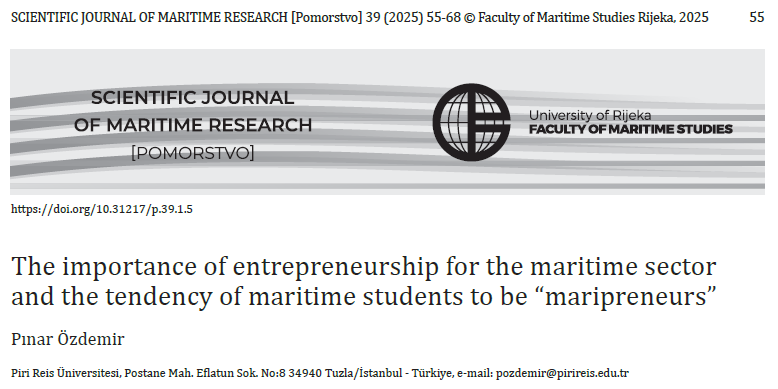The importance of entrepreneurship for the maritime sector and the tendency of maritime students to be “maripreneurs”
Keywords:
maritime, entrepreneurship, entrepreneurship education, technological developments, unemploymentAbstract
The possibility that technological advances may replace human power and lead to unemployment is one of the most debated issues in all sectors, including maritime. While some studies argue that this will not lead to unemployment but to a shift in the skills expected of workers, others insist that the probability of unemployment is high. Assuming that the second option is realized, it will be necessary to take some measures to create new jobs for laid-off workers. One of these measures
could be to train people to have an entrepreneurial mindset, as entrepreneurship plays a key role in creating new jobs and thus increasing employment. In this study, the entrepreneurial tendencies of maritime students were investigated to see their potential to become entrepreneurs. For this purpose, the entrepreneurial orientation scale developed by Bolton and Lane was applied to 268 students at a maritime university. The data evaluated with the R program shows that the students
have above-average risk-taking, proactiveness, and innovativeness skills which are important for entrepreneurship, thus they have the potential to become entrepreneurs or intrapreneurs if appropriate entrepreneurship education is provided.

Downloads
Published
Issue
Section
Categories
License
Copyright (c) 2024 Pinar Ozdemir

This work is licensed under a Creative Commons Attribution-NonCommercial-NoDerivatives 4.0 International License.
Scientific Journal of Maritime Research understands the need for authors to disseminate and maximize the impact of their research. When submitting an article for publishing in Scientific Journal of Maritime Research, it implies that the Corresponding Author transfers, with the consent of all Coauthors, the copyright ownership in the referenced submission, including all versions in any format now known or hereafter developed, to the Scientific Journal of Maritime Research.
Copyright protects your original work and research material and prevents others from using it without your permission. Others will be required to credit you and your work properly, thus increasing its impact. Should your submission be rejected or withdrawn prior to acceptance for publication by Scientific Journal of Maritime Research, this transfer will be null and void.
Authors, users or readers of an article need clear instructions on how they can use the article. Scientific Journal of Maritime Research uses the Creative Commons Attribution-NonCommercial-NoDerivatives (CC-BY-NC-ND) 4.0 International License, which governs the use, publishing and distribution of articles by authors, publishers and the wider general public.
The authors are allowed to post a digital file of the published article, or the link to the published article (Scientific Journal of Maritime Research web page) may be made publicly available on websites or repositories, such as the Author’s personal website, preprint servers, university networks or primary employer’s institutional websites, third party institutional or subject-based repositories, and conference websites that feature presentations by the Author(s) based on the published article, under the condition that the article is posted in its unaltered Scientific Journal of Maritime Research form, exclusively for non-commercial purposes.




